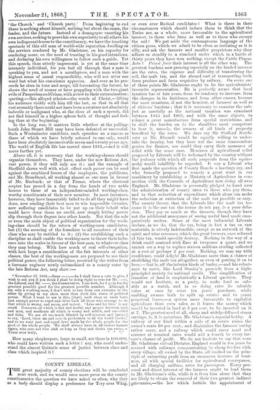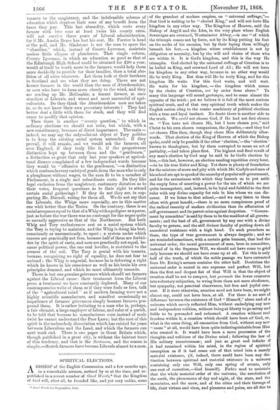COUNTY LIBERALS.
THE great majority of county elections will be concluded next week, and we would once more press on the county constituencies the question we have asked so often, why they as a body should display a preference for Tory over Whig, , or even over Radical candidates ? What is there in their 'circumstances which should induce them to think that the Tories are, as a whole, more favourable to the agricultural I interest, to those who farm as well as to those who occupy the soil ? We put aside the contemptuous language of the citizen press, which we admit to be often as irritating as it is silly, and ask the farmers and smaller proprietors why they adhere so steadily to a standard under which in a battle of thirty years they have won nothing, except the Cattle Plague Acts ? Prima facie their interest is all the other way. The greatest burdens now pressing especially on the landed interest are the rates, the expense and difficulty of transferring the soil, the malt tax, and the absurd cost of transporting both farm produce and farm requisites by railway. On every one of those points Mr. Gladstone ought to be the agriculturists' favourite representative. Ile is perfectly aware that local taxation has of late years, front its tendency to increase, from the changes in its incidence, and from other causes, become the most vexatious, if not the heaviest, of farmers' as well as of citizens' burdens"; that it is necessary to examine the sub- ject as carefully as the national taxation was examined between 1845 and 1865, and with the same objects, to release a great manufacture from special restrictions, and to shift the burden on to the shoulders most competent to bear it, namely, the owners of all kinds of property benefited by the rates. Wo dare say Sir Stafford North- cote or Mr. Disraeli would be equally willing to under- take the inquiry, but they have not the same transcendent genius for finance, nor could they carry their measures of relief with the same ease. Measures of agricultural relief proposed by Liberals will be welcomed by the country without the jealousy with which all such proposals from the squire- archy would infallibly be regarded. It was a Liberal who first made the question of County Boards a hustings cry, and who formally proposed to remedy a great want in our machinery by establishing a Ministry of Agriculture in con- nection with the Councils of Agriculture now rising all over England. Mr. Gladstone is personally pledged to hand over the administration of county rates to those who pay them, and to that reduction of expenditure which alone can make the reduction or extinction of the malt tax possible or easy. The county theory, that the Liberals like the malt tax bo- cause it is the one tax the towns do not pay, is a pure delu- sion. They pay as much as the farmers, though they have not the additional annoyance of seeing useful land made com- paratively useless. Some of the most influential Liberals declare, as we do, that the tax, being in fact a tax on raw materials, is utterly indefensible, except as an outwork of the spirit and wine revenues, which the great brewers, once relieved of this tax, would speedily destroy. Nothing in the way of a drink could contend with Bass at twopence a quart, and we cannot see a way to replace sixteen millions sterling collected at a cost of perhaps 2 per cent. Nothing, we may say with confidence, could delight Mr. Gladstone more than a chance of abolishing the malt tax altogether, or even of putting it on to beer,—that is, off the inferior kinds of barley,—and his reluct- ance to move, like Lord Stanley's, proceeds from a high- principled anxiety for national credit. The simplification of transfers of land is emphatically a Liberal question. They would not hesitate, as a party, to make land as sale- able as a watch, and in so doing raise its saleable value at once by some ten years' purchase, while enabling owners both to split up estates and to grant perpetual leases,—a system more favourable to capitalist agriculture than even sales, as it leaves the money which would be invested in land at :3 per cent. to be invested on it at 7. The greatest need of all, cheap and widely-diffused steam carriage, is, it is notorious, Mr. Gladstone's especial hobby. A railway of any kind within a mile of an estate raises the owner's rents 10 per cent., and diminishes the farmers' outlay rather more, and a railway which could carry marl and manure at nominal rates would add a fourth to every far- mer's chance of profit. We do not hesitate to say that were Mr. Gladstone virtual Dictator, England would in ten years be covered with railways communicating by cheap feeders with every village, all owned by the State, all worked on the prin- ciple of extracting profit from an enormous increase of busi- ness, all with special facilities for agricultural conveyance, and all charging uniform rates for passengers. Every per- sonal and direct interest of the farmers ought to lead them to Mr. Gladstone's side, while it is from him alone that they are likely to obtain the removal of their two greatest indirect grievances,—the law which forbids the appointment of
tenants to the magistracy, and the indefensible scheme of education which deprives their sons of any benefit from the taxes they pay. This last absurdity, which costs every farmer with two sons at least twice his county rates, will not survive three years of Liberal administration, for if Mr. Austin Bruce has lost his seat, Mr. Forster is head of the poll, and Mr. Gladstone is not the man to spare the " charities," which, instead of County Lyceums, maintain useless Ittle cliques of plunderers. That single reform, County Lyceums, in which an education as good as that of the Edinburgh High School could be obtained for• £20 a year, would of itself he worth more to the farmers, would help them more decidedly to provide for their families, than a total abo- lition of all rates whatever. Let them look at their brethren in Scotland and see what they are doing. There are not keener farmers in the world than the men of Aberdeenshire, or men who have to farm more closely to the wind, and they are sending up Mr. McCombie, a tenant farmer, at once sturdiest of Liberals, and wisest and most successful of agri- culturists. Do they think the Aberdeenshire men are taken in, or do not know their own pecuniary interests ? They had better deal a little with them for stock, and they will find cause to modify that opinion.
Then there is another " county question," to which in ordinary elections we should not refer, but which, with a new constituency, becomes of direct importance. The main indeed, we may say the only—latent object of Tory politics is to keep the existing social system untouched. If they prevail, it will remain, and we would ask the farmers, all over England, if they truly like it, if the preposterous distinction kept up between them and the "gentlemen," a distinction so great that only last year speakers at agricul- tural dinners complained of a few independent words because they would be " offensive to the gentlemen,"—a distinction which confounds every variety of grade, from the man who is only a ploughman without wages, to the man fit to be a member of Parliament, in a single and subordinate caste. Do they like legal exclusion from the magistracy, customary dictation as to their votes, frequent questions as to their right to attend certain social gatherings ? If they do not they are, in sup- porting Mr. Disraeli, voting for them all. We do not say that the Liberals, the Whigs more especially, are in this matter one whit better than the Tories. On the contrary, there is no social arrogance equal to that of a Whig with a pedigree or a purse, just as before the war there was no contempt for the negro quite so uneasily aggressive as that of the Northerner. But both Whig and Tory exclusiveness rest on a social system which the Tory is trying to maintain, and the Whig is doing his best, consciously or unconsciously, to upset ; a system under which careers are practically not free, because half of them are forbid- den by the spirit of caste, and men are practically not equal, be- cause political power, the one real leveller, is restricted to the owners of the soil. The Tory is genial with his tenants, because, recognizing no right of equality, he does not fear to unbend ; the Whig is ungenial, because he is deferring a right which he knows in his conscience as well as his brain his own principles demand, and which he must ultimately concede.
There is but one genuine grievance which should set farmers against the Liberal cause : their treatment from the Liberal press, a treatment we have constantly deplored. Many of our contemporaries write of them as if they were fools or foes, talk of the " agricultural mind " as if modern farming were not a highly scientific manufacture, and manifest occasionally an impatience of farmers' grievances simply because farmers pro- pound them. It is rather irritating to a man who is, perhaps, a fair chemist, a large employer of labour•, and ruler of a parish, to be told that because he manufactures corn instead of mule twist he cannot understand the Poor Laws ; but the root of this spirit is the melancholy dissociation which has existed for years between Liberalism and the Land, and which the farmers can next week end. There is one paper in Great Britain which, though published in a great city, is without the faintest trace of this tendency, and that is the Scotsman, and the reason is simple,—Scotch farmers have become Liberals almost to a man.







































 Previous page
Previous page